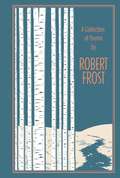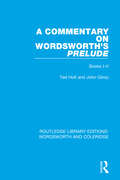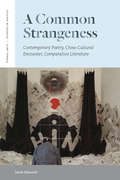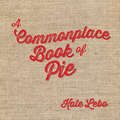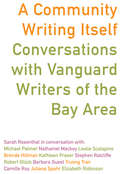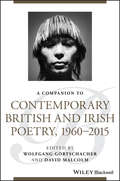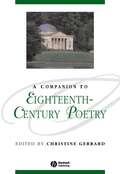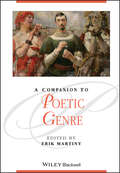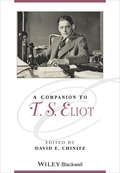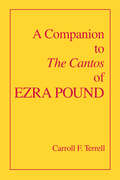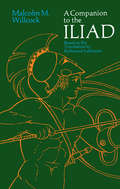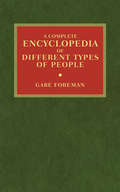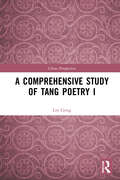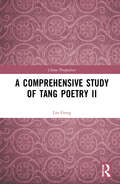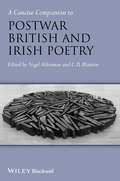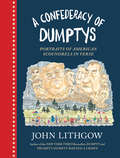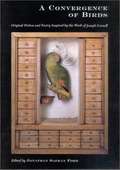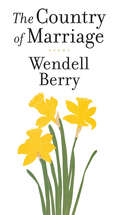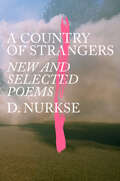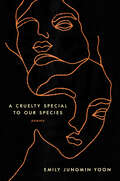- Table View
- List View
A Collection of Poems by Robert Frost (Leather-bound Classics)
by Robert FrostThe early works of beloved poet Robert Frost, collected in one volume.The poetry of Robert Frost is praised for its realistic depiction of rural life in New England during the early twentieth century, as well as for its examination of social and philosophical issues. Through the use of American idiom and free verse, Frost produced many enduring poems that remain popular with modern readers. A Collection of Poems by Robert Frost contains all the poems from his first four published collections: A Boy’s Will (1913), North of Boston (1914), Mountain Interval (1916), and New Hampshire (1923), including classics such as “The Road Not Taken,” “Fire and Ice,” and “Stopping by Woods on a Snowy Evening.”
A Commentary on Wordsworth's Prelude: Books I-V (RLE: Wordsworth and Coleridge #5)
by Ted Holt John GilroyFirst published in 1983, this books aims to guide Wordsworth students through his difficult masterpiece by reading it in continuous sequence and making its sense emerge. The special value of this commentary is that it explains the structure of The Prelude by encouraging study of the poem as a continuous whole rather than selectively looking at individual sections — an approach that has typified modern criticism of the work. This depends upon a close attention to the careful arrangement of the verse paragraphs, all of which make an indispensable contribution to the overall thought pattern, thus leading to a fuller appreciation and understanding of the poem.
A Common Strangeness: Contemporary Poetry, Cross-Cultural Encounter, Comparative Literature (Verbal Arts: Studies in Poetics)
by Jacob EdmondWhy is our world still understood through binary oppositions—East and West, local and global, common and strange—that ought to have crumbled with the Berlin Wall? What might literary responses to the events that ushered in our era of globalization tell us about the rhetorical and historical underpinnings of these dichotomies?In A Common Strangeness, Jacob Edmond exemplifies a new, multilingual and multilateral approach to literary and cultural studies. He begins with the entrance of China into multinational capitalism and the appearance of the Parisian flâneur in the writings of a Chinese poet exiled in Auckland, New Zealand. Moving among poetic examples in Russian, Chinese, and English, he then traces a series of encounters shaped by economic and geopolitical events from the Cultural Revolution, perestroika, and the June 4 massacre to the collapse of the Soviet Union, September 11, and the invasion of Iraq. In these encounters, Edmond tracks a shared concern with strangeness through which poets contested old binary oppositions as they reemerged in new, post-Cold War forms.
A Commonplace Book of Pie
by Jessica Bonin Kate LeboIn this debut collection, award-winning poet and baker Kate Lebo redefines everything we thought we knew about pie. An eclectic mix of prose poems, fantasy zodiac, and humor, A Commonplace Book of Pie explores the tension between the container and the contained while considering the real and imagined relationships between pie and those who love it.Expanding on Lebo's successful chapbook of the same name, this volume includes new poems as well as more than two dozen Americana-themed illustrations by artist Jessica Lynn Bonin. Bonin's art adds a sense of nostalgia alongside Lebo's modern style, and together with the text, puts pie and the art of baking in a fresh, contemporary context.Kate Lebo makes poems and pies in Seattle. Her writing has appeared in Best New Poets, Gastronomica, and Poetry Northwest. When Kate is not creating poems, she is hosting her semi-secret pie social, Pie Stand, around the US, teaching creative writing at the University of Washington and Richard Hugo House, and pie-making at Pie School, her cliche-busting pastry academy.Jessica Lynn Bonin is an illustrator and mixed-media artist whose work adds a modern twist to familiar images of American culture. Bonin's murals are displayed in New York,Oregon and Washington state. She lives and works in a former hardware store and lumberyard in Edison, Washington.
A Community Writing Itself
by Sarah RosenthalA Community Writing Itself features internationally respected writers Michael Palmer, Nathaniel Mackey, Leslie Scalapino, Brenda Hillman, Kathleen Fraser, Stephen Ratcliffe, Robert Glu¨ck, and Barbara Guest, and important younger writers Truong Tran, Camille Roy, Juliana Spahr, and Elizabeth Robinson. The book fills a major gap in contemporary poetics, focusing on one of the most vibrant experimental writing communities in the nation. The writers discuss vision and craft, war and peace, race and gender, individuality and collectivity, and the impact of the Bay Area on their work.
A Community Writing Itself
by Sarah RosenthalA Community Writing Itself features internationally respected writers Michael Palmer, Nathaniel Mackey, Leslie Scalapino, Brenda Hillman, Kathleen Fraser, Stephen Ratcliffe, Robert Glu¨ck, and Barbara Guest, and important younger writers Truong Tran, Camille Roy, Juliana Spahr, and Elizabeth Robinson. The book fills a major gap in contemporary poetics, focusing on one of the most vibrant experimental writing communities in the nation. The writers discuss vision and craft, war and peace, race and gender, individuality and collectivity, and the impact of the Bay Area on their work.
A Community Writing Itself
by Sarah RosenthalA Community Writing Itself features internationally respected writers Michael Palmer, Nathaniel Mackey, Leslie Scalapino, Brenda Hillman, Kathleen Fraser, Stephen Ratcliffe, Robert Glu¨ck, and Barbara Guest, and important younger writers Truong Tran, Camille Roy, Juliana Spahr, and Elizabeth Robinson. The book fills a major gap in contemporary poetics, focusing on one of the most vibrant experimental writing communities in the nation. The writers discuss vision and craft, war and peace, race and gender, individuality and collectivity, and the impact of the Bay Area on their work.
A Companion to Contemporary British and Irish Poetry, 1960 - 2015 (Blackwell Companions to Literature and Culture)
by David Malcolm Wolfgang GörtschacherA comprehensive and scholarly review of contemporary British and Irish Poetry With contributions from noted scholars in the field, A Companion to Contemporary British and Irish Poetry, 1960-2015 offers a collection of writings from a diverse group of experts. They explore the richness of individual poets, genres, forms, techniques, traditions, concerns, and institutions that comprise these two distinct but interrelated national poetries. Part of the acclaimed Blackwell Companion to Literature and Culture series, this book contains a comprehensive survey of the most important contemporary Irish and British poetry. The contributors provide new perspectives and positions on the topic. This important book: Explores the institutions, histories, and receptions of contemporary Irish and British poetry Contains contributions from leading scholars of British and Irish poetry Includes an analysis of the most prominent Irish and British poets Puts contemporary Irish and British poetry in context Written for students and academics of contemporary poetry, A Companion to Contemporary British and Irish Poetry, 1960-2015 offers a comprehensive review of contemporary poetry from a wide range of diverse contributors.
A Companion to Eighteenth-Century Poetry (Blackwell Companions to Literature and Culture #35)
by Christine GerrardThis broad-ranging Companion offers readers a thorough grounding in both the background and the substance of eighteenth-century poetry in all its rich variety. Provides an up-to-date and wide-ranging guide to eighteenth-century poetry Reflects the dramatic transformation which has taken place in the study of eighteenth-century poetry over the past two decades Opens with a section on contexts, discussing poetry’s relationships with patriotism, politics, science, and the visual arts, for example Discusses poetry by male and female poets from all walks of life Includes numerous close readings of individual poems, ranging from Pope’s The Rape of the Lock to Mary Collier’s The Woman’s Labour Includes more provocative contributions on subjects such as rural poetry and the self-taught tradition, British poetry 'beyond the borders', the constructions of femininity, women as writers and women as readers. Designed to be used alongside David Fairer and Christine Gerrard’s Eighteenth-Century Poetry: An Annotated Anthology, 3rd edition (Wiley Blackwell, 2014)
A Companion to Poetic Genre (Blackwell Companions to Literature and Culture #171)
by Erik MartinyA Companion to Poetic Genre brings together over 40 contributions from leading academics to provide critical overviews of poetic genres and their modern adaptations. Covers a large range of poetic cultural traditions from Britain, Ireland, North America, Japan and the Caribbea Summarises many genres from their earliest origins to their most recent renderings The only full-length critical collection to deal with modern adaptations of poetic genres Contributors include Bernard O’Donoghue, Stephen Burt, Jahan Ramazani, and many other notable scholars of poetry and poetics
A Companion to T. S. Eliot (Blackwell Companions to Literature and Culture #168)
by David E. ChinitzReflecting the surge of critical interest in Eliot renewed in recent years, A Companion to T.S. Eliot introduces the 'new' Eliot to readers and educators by examining the full body of his works and career. Leading scholars in the field provide a fresh and fully comprehensive collection of contextual and critical essays on his life and achievement. It compiles the most comprehensive and up-to-date treatment available of Eliot's work and career It explores the powerful forces that shaped Eliot as a writer and thinker, analyzing his body of work and assessing his oeuvre in a variety of contexts: historical, cultural, social, and philosophical It charts the surge in critical interest in T.S. Eliot since the early 1990s It provides an illuminating insight into a poet, writer, and critic who continues to define the literary landscape of the last century
A Companion to The Cantos of Ezra Pound
by Carroll F. TerrellThe Companion is a major contribution to the literary evaluation of Pound's great, but often bewildering and abstruse work, The Cantos. Available in a one-volume paperback edition for the first time, the Companion brings together in conveniently numbered glosses for each canto the most pertinent details from the vast body of work on the Cantos during the last thirty years. The Companion contains 10,421 separate glosses that include translations from eight languages, identification of all proper names and works, Pound's literary and historical allusions, and other exotica, with exegeses based upon Pound's sources. Also included is a supplementary bibliography of works on Pound, newly updated, and an alphabetized index to The Cantos.
A Companion to The Iliad: Based on Translation by Richmond Lattimore
by Malcolm M. WillcockThose who are able to read Homer in Greek have ample recourse to commentaries, but the vast majority who read the Iliad in translation have not been so well served—the many available translations contain few, if any, notes. For these readers, Malcolm M. Willcock provides a line-by-line commentary that explains the many factual details, mythological allusions, and Homeric conventions that a student or general reader could not be expected to bring to an initial encounter with the Iliad. The notes, which always relate to particular lines in the text, have as their prime aim the simple, factual explanation of things the inexperienced reader would be unlikely to have at his or her command (What is a hecatomb? Who is Atreus' son?). Second, they enhance an appreciation of the Iliad by illuminating epic style, Homer's methods of composition, the structure of the work, and the characterization of the major heroes. The "Homeric Question," concerning the origin and authorship of the Iliad, is also discussed. Professor Willcock's commentary is based on Richmond Lattimore's translation—regarded by many as the outstanding translation of the present generation—but it may be used profitably with other versions as well. This clearly written commentary, which includes an excellent select bibliography, will make one of the touchstones of Western literature accessible to a wider audience.
A Companion to the Iliad
by Malcolm M. WillcockThose who are able to read Homer in Greek have ample recourse to commentaries, but the vast majority who read the Iliad in translation have not been so well served--the many available translations contain few, if any, notes. For these readers, Malcolm M. Willcock provides a line-by-line commentary that explains the many factual details, mythological allusions, and Homeric conventions that a student or general reader could not be expected to bring to an initial encounter with the Iliad. The notes, which always relate to particular lines in the text, have as their prime aim the simple, factual explanation of things the inexperienced reader would be unlikely to have at his or her command (What is a hecatomb? Who is Atreus' son?). Second, they enhance an appreciation of the Iliad by illuminating epic style, Homer's methods of composition, the structure of the work, and the characterization of the major heroes. The "Homeric Question," concerning the origin and authorship of the Iliad, is also discussed. Professor Willcock's commentary is based on Richmond Lattimore's translation--regarded by many as the outstanding translation of the present generation--but it may be used profitably with other versions as well. This clearly written commentary, which includes an excellent select bibliography, will make one of the touchstones of Western literature accessible to a wider audience.
A Complete Encyclopedia of Different Types of People
by Gabe ForemanPeople who rely on stereotypes are often vilified. But really, is there a better way to classify people? There are some taxonimical difficulties, though. Exactly how many types of people are there? What behaviours are characteristic of each particular group? How do you know if you've spotted an armchair psychologist or a kleptomaniac? Gabe Foreman's A Complete Encyclopedia of Different Types of People is not your average reference book. It turns a series of sociological case studies into a functional encyclopedia that doubles as a unique, achingly funny, always engaging collection of poems. 'Bridesmaids,' 'Day Traders,' 'Entomologists' and 'Number Crunchers' are all dutifully catalogued in a series of luminously strange, compellingly original lyric and prose poems.The resulting field guide to our disparate humanity is often absurd, sometimes sad and frequently a mixture of both, as each entry unravels according to its own spidery logic.
A Comprehensive Study of Tang Poetry I (China Perspectives)
by Lin GengTang poetry is one of the most valuable cultural inheritances of Chinese history. Its distinctive aesthetics, delicate language, and diverse styles constitute great literature in itself, as well as a rich topic for literary study. This two-volume set constitutes a classic analysis of Tang poetry in the “Golden Age” of Chinese poetry (618–907 CE). In this volume, the author provides a general understanding of poetry in the “High Tang” era from a range of perspectives. Starting with an in-depth discussion of the Romantic tradition and historical context, the author focuses on poetic language patterns, Youth Spirit, maturity symbols, and prototypes of the poetry. The author demonstrates that the most valuable part of Tang poetry is how it can provide people with a new perspective on every aspect of life. This book will appeal to researchers, scholars, and students of Chinese literature and especially of classical Chinese poetry. People interested in Chinese culture more widely will also benefit from this book.
A Comprehensive Study of Tang Poetry II (China Perspectives)
by Lin GengTang poetry is one of the most valuable cultural inheritances of Chinese history. Its distinctive aesthetics, delicate language and diverse styles constitute great Literature in itself, as well as a rich topic for literary study. This two-volume set constitutes a classic analysis of Tang poetry in the “Golden Age” of Chinese poetry (618–907 CE). This volume focuses on the prominent poets and poems of Tang poetry. Beginning with an introduction to the “four greatest poets” - Li Bai, Du Fu, Wang Wei and Bai Juyi - the author discusses their subjects, language, influence, and key works. The volume also includes essays on the masterpieces of Tang poetry, categorized by topics such as love and friendship, aspirations and seclusion, as well as travelling and nostalgia. As the author stresses, Tang poetry is worth rereading because it makes our invigorates our mental wellbeing, leaving it powerful and full of vitality. This book will appeal to researchers and students of Chinese literature, especially of classical Chinese poetry. People interested in Chinese culture will also benefit from the book.
A Concise Companion to Postwar British and Irish Poetry (Concise Companions to Literature and Culture #31)
by Nigel Alderman C. D. BlantonThis volume introduces students to the most important figures, movements and trends in post-war British and Irish poetry. An historical overview and critical introduction to the poetry published in Britain and Ireland over the last half-century Introduces students to figures including Philip Larkin, Ted Hughes, Seamus Heaney, and Andrew Motion Takes an integrative approach, emphasizing the complex negotiations between the British and Irish poetic traditions, and pulling together competing tendencies and positions Written by critics from Britain, Ireland, and the United States Includes suggestions for further reading and a chronology, detailing the most important writers, volumes and events
A Coney Island of the Mind
by Lawrence FerlinghettiThis is one of the most widely read books of poetry of our day. Ferlinghetti's popularity: his material, his tone, and phrasing, are taken from everyday life, from the "Coney Island" of ideas and feelings in all our minds, and he transmutes them into poetry of satiric bite and lyric beauty.
A Confederacy of Dumptys: Portraits of American Scoundrels in Verse
by John LithgowThe next book in John Lithgow's New York Times bestselling seriesFollowing the success of New York Times bestsellers Dumpty and Trumpty Dumpty Wanted a Crown, award-winning actor, author, and illustrator John Lithgow presents the third book in his runaway hit series. A Confederacy of Dumptys takes us through a history of twenty-five "American Scoundrels" in this all-new collection of Lithgow's satirical poems and illustrations.While the Trump Era was rife with corruption and abuse of power, it was nothing new. Through Lithgow's cutting humor, you will read about a rogues' gallery of villains that came before Donald J. Trump, powerful men and women who were corrupt, venal, criminal, adulterous, racist, or just plain disgusting. With dark and lyrical stories from across American history, you will learn about long-forgotten figures and bad actors of today, including the first Grand Wizard of the Ku Klux Klan, the perpetrator of 19th century women's pyramid schemes, and participants in both the Watergate scandal and the Capitol insurrection. Trump and Nixon show up, of course, but also Leona Helmsley, Boss Tweed, Typhoid Mary, Newt Gingrich, Ted Cruz, and many more. Skipping through time, and delivered with classic Lithgow wit and style, A Confederacy of Dumptys is an exuberant reminder of how not to repeat history.Digital audio edition read by the author.The perfect book for:• Political satire fans—viewers of The Daily Show with Trevor Noah, Last Week Tonight with John Oliver, and The Late Show with Stephen Colbert.• American history buffs and trivia enthusiasts—readers of Jon's Stewart's America (The Book): A Citizen's Guide to Democracy Inaction and Josh Clark's Stuff You Should Know: An Incomplete Compendium of Mostly Interesting Things.• Poetry, art, and illustration aficionados.
A Convergence of Birds: Original Fiction and Poetry
by Jonathan Safran FoerA living notebook of contemporary literature, and the twentieth anniversary issue promises to be a capstone in this continuing project. Among the many writers whose work will be featured in this special issue are Richard Powers, Mary Caponegro, Rick Moody Paul West, Joyce Carol Oates, Nomi Eve, Joanna Scott, Ann Lauterbach, Robert Creeley, Martine Bellen, Elaine Equi, John Ashbery, Mei-mei Berssenbrugge, as well as a previously untranslated, unpublished short story by Vladimir Nabokov.
A Country of Marriage: Poems
by Wendell BerryFirst published in 1971, The Country of Marriage is Wendell Berry's fifth volume of poetry. What he calls "an expansive metaphor" is "a farmer's relationship to his land as the basic and central relation of humanity to creation." "Similarly, marriage is the basic and central community tie; it begins and stands for the relation we have to family and to the larger circles of human association. And these relationships are in turn basic to, and may stand for, our relationship to God and to the sustaining mysteries and powers of creation." Each of the thirty-five poems in this collection is concerned with this metaphor. The long sequence that is itself entitled "The Country of Marriage," perhaps the finest single work in the book, is a grave, moving, and beautifully wrought love poem. But the shorter lyrics have an equal grace and beauty-writing that contains the exhilarating lucidity of mountain spring water. And there are most notably, several more poems about the "Mad Farmer," who advises us here to 'every day do something that won't compute.' Berry has here perfected a work that is immediately accessible but that becomes, as we read it again, always more satisfying, reverberant with manifold meanings.
A Country of Strangers: New and Selected Poems
by D. NurkseIn an illuminating collection of selected poems over thirty-five years, one of our most essential American poets casts a clear eye on our politics, our places, and our heart&’s hidden stories.D. Nurkse&’s immigrant parents met on a boat out of Europe in 1940; he was a child of the generation whose anxieties were forged in the shadow of Hiroshima and the aftermath of WWII. His poems extend that child&’s dignified ignorance into an open encounter with the cataclysms of the latter twentieth century and with family structures. Whispers of the old country of Estonia provide the backdrop for the boy&’s baseballs, thrown in the fading twilight of the 1950s (&“Secretly, I was proudest of my skill / at standing alone in the darkness&”). The young man explores sexual passion and the arrival of a child in a young marriage (&“We showed her daylight in our cupped hands&”), while the mature poet writes of loneliness and community in our cities (&“but on the streets / there was no one&”), and the urgent need for us to keep expressing our will as citizens. Throughout this matchless career, over eleven books, Nurkse has crafted visceral lines that celebrate the fragility of what simply exists—birdsong, moonrise, illness, water towers—and the complexity of human perception, our stumble forward through it toward understanding.
A Cruelty Special to Our Species: Poems
by Emily Jungmin YoonA piercing debut collection of poems exploring gender, race, and violence from a sensational new talentIn her arresting collection, urgently relevant for our times, poet Emily Jungmin Yoon confronts the histories of sexual violence against women, focusing in particular on Korean so-called “comfort women,” women who were forced into sexual labor in Japanese-occupied territories during World War II. In wrenching language, A Cruelty Special to Our Species unforgettably describes the brutalities of war and the fear and sorrow of those whose lives and bodies were swept up by a colonizing power, bringing powerful voice to an oppressed group of people whose histories have often been erased and overlooked. “What is a body in a stolen country,” Yoon asks. “What is right in war.” Moving readers through time, space, and different cultures, and bringing vivid life to the testimonies and confessions of the victims,Yoon takes possession of a painful and shameful history even while unearthing moments of rare beauty in acts of resistance and resilience, and in the instinct to survive and bear witness.
A Cup of Christmas Tea
by Tom HeggA nephew's visit to an elderly great aunt at Christmastime brings him memories of past holidays and the realization of how the human spirit can triumph over adversity.
